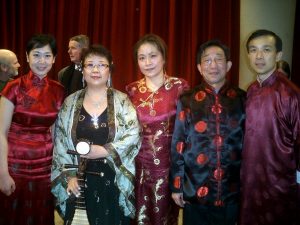BBC 英伦网 赵梦
悠扬的民乐,浓郁的年味,把伦敦泰晤士河畔的大年初三渲染得古香古色,又热闹非凡。一时间,我仿佛置身国内,回到儿时,听着民乐,打着灯笼过大年,领略管弦丝竹之悦耳,享受余音绕梁之美妙。
伦敦圣约翰音乐大厅(St. John’s Concert Hall)位于Smith Square,紧邻西敏寺(Westminster Abbey)和国会大厦(House of Parliament)。虎年初三晚,在BBC英伦网实习的我和Osman Ali有幸受邀在这里欣赏一场精彩绝伦的中国经典民乐新春音乐会。
放眼望去,各色皮肤的观众都翘首期待。我刚入座,坐在身边的一对头发花白的英国夫妇就微笑地对我说:“虎年大吉,我们一起过个中国年!”看来不只伦敦市长Boris Johnson称今年是“Lucky Tiger Year”,英国民众也在期待在老虎的雄威下,让2010年能够既“auspicious”又“prosperous”呢。
竹笛演奏家董秋明大师和来自上海音乐学院的朱晓萌女士告诉我,他们每一次在海外表演都很受感动。从开场的《梁祝》伊始,全场观众就陶醉在五位音乐大师的纯熟技巧和完美配合中。中国90年代上海“笛子三剑客”之一的董秋明大师一曲代表作《秦川抒怀》将西北的广袤情怀展现在世人面前。来自上海音乐学院的陈大灿教授用《二泉映月》带领我们回顾过去。
北派古筝独奏《渔舟唱晚》的舒缓轻扬,荡漾起夕阳映万顷之波;唐朝伊州名曲 《阳关三叠》的绵延悠长,道不尽手足间惜别之情 。《春江花月夜》下,江楼钟鼓声声, 熏风拂涟漪;《茉莉花》香飘散,《荫中鸟》鸣阵阵, 碧云映柳枝。
演奏曲目共17首,最后在《彩云追月》的琴瑟合奏中演奏会圆满结束,持续不断的掌声和欢呼响彻音乐大厅,感动着我,也感动着每一位在场的观众。
 巴西作曲家Nicolaiewsky先生兴奋地告诉我,这是他第一次听现场版的中国音乐。现场观众反响热烈. 由于圣约翰音乐厅是演奏西方经典音乐的殿堂,一些西方音乐专业人士也前来捕捉灵感。来自巴西阿雷格里港(Porto Alegre, Brazil)的作曲家Nicolaiewsky先生兴奋地告诉我,这是他第一次听现场版的中国音乐。他深受震撼,决定选一首中国民乐给他合作的新电影配乐!我给他推荐了我从小一直喜爱练习的《春江花月夜》,希望他能体验夕阳箫鼓,和浔阳琵琶。
巴西作曲家Nicolaiewsky先生兴奋地告诉我,这是他第一次听现场版的中国音乐。现场观众反响热烈. 由于圣约翰音乐厅是演奏西方经典音乐的殿堂,一些西方音乐专业人士也前来捕捉灵感。来自巴西阿雷格里港(Porto Alegre, Brazil)的作曲家Nicolaiewsky先生兴奋地告诉我,这是他第一次听现场版的中国音乐。他深受震撼,决定选一首中国民乐给他合作的新电影配乐!我给他推荐了我从小一直喜爱练习的《春江花月夜》,希望他能体验夕阳箫鼓,和浔阳琵琶。
到场的华人面孔中,有不少和我一样,是中国留学生。同学们说,虽然今年不能回家过年,略有遗憾,但能在伦敦听到这样一场亲切熟悉,又如此高质量的民乐演奏,感到格外惊喜。今晚的演奏者,竹笛演奏家董秋明大师和来自上海音乐学院的朱晓萌女士告诉我,他们每一次在海外表演都很受感动,因为能看到西方对于我们民族音乐的了解和欣赏逐步加深。
今晚演奏会的主办者刘莉女士表示,她相信中国有丰富的文化和艺术形式可以和全世界分享,中西方文化交流促进彼此了解。她希望能够得到更多的支持,加以更广的宣传,把中国的民族音乐带领到世界上去,也让西方的理念渗透到中国音乐中来,让在英国的中西方观众以后每年都能享受到中国经典民乐的视听盛宴。
之前曾读到一篇文章,探讨的是中国民乐的国际化蔓延是“出路”还是 “迷路”?从今晚的壮观景象看来,前方倒是光明的很。欢呼,掌声,尖叫,鼓励着我们继续举办和推广这样的活动,让更多的世人听到中国的民乐,品味中国的文化,了解中国的历史,领略中国的古韵。
[/et_pb_divi_atm]
By British BBC reporter Zhao Meng
A poignant and evocative musical experience. Imagine the crowded bank of the Thames river with the grand Parliament building and London’s Big Ben as a backdrop. Add to this a spicy taste of a traditional Chinese Spring Festival and a splash of Oriental colour.
To me it was like being swept back to my childhood, in my traditional Chinese home village, immersed in the crowded festival atmosphere with coloured lanterns flashing in front of my eyes and the sound of music played by these beautiful instruments filling my ears, the excitement stayed with me for days.
 It’s the third day of the Tiger year celebration, my colleague and I were lucky to be there to have a celebratory ‘taste of home’. A real pleasure, as due to working in London it’s not easy to get back for a traditional new year.
It’s the third day of the Tiger year celebration, my colleague and I were lucky to be there to have a celebratory ‘taste of home’. A real pleasure, as due to working in London it’s not easy to get back for a traditional new year.
As I sit down I look around the audience and see a large crowd made up of a typical cross section of the London population, all ages and races.
An English senior couple sit beside me and smile. They whispered to me: We are coming to join the celebration of the tiger year”. Just like the London Mayor Boris Johnson who referred to the words “Lucky Tiger Year”,” auspicious” and “prosperous” in his speech to Chinese media; westerners are increasingly interested in Chinese culture and the Tiger and Dragon symbols.
I had a chance to meet the renowned flute musician Dong qiu-ming and Guzheng master Zhu Xiao-meng, they both came from the Shanghai Conservatory of Music. They told me that westerners have a good ear for music and that they are always moved by the beauty of Chinese melodies.
The concert started with one of my favourite pieces the magnificent composition, Butterfly Lovers. The whole audience were totally immersed in the astonishing and masterful play of the five musicians on stage. Their coordination and combination of the different traditional instruments were just perfect.
Musician Dong Qiu-ming is rated as one of the top three flute players in Shanghai. His repertoire including “The Air of Qin River” exhibited the passionate character and earthy joy of the West-Northern China ethnic group and was a fine example of virtuoso playing. Musician Chen Da-cai, a professor of the Erhu instrument in the Shanghai Conservatory of Music, demonstrated “Reflection of the Moon in the Pond”, which was composed by the musical genius Ar Bin, one of the most acclaimed pieces in the world music library. Chen Da-chen’s rendition was beautiful.
- The Southern Guzeng tune “The Song of Fishing Boats at Sunset”, always provokes a scene of a lake, water gently spreading, waves shining with the golden sunset, carrying fishing boats home.
- The Tang dynasty famous tune “Yang Guan Farewell”, elegantly expressed the sentimentality that words are lost when seeing off a soul mate who is leaving the home village for good.
- The music of “Spring River Blossom Moon Night” brought to mind the scene of a Chinese spring painting: The spring water caressed by weeping willows, A tall pagoda surrounded by blossoms, shadowed in the moonlight, the sending bell ringing far away…
- The tune of “Jasmine” was resonant of the everlasting fragrance…
- The song of “Birds Shading in the Trees” filled the hall with cheerful birds singing and dancing in the green cloud forest…
In total seventeen fantastic Chinese pieces were performed ending with the haunting melody “Coloured Clouds Run After the Moon”, The applause was repeated and repeated, the audience stood up. Their cheerful sound and faces leaving no doubt of a popular and successful concert. Watching these expressive faces filled with appreciation and gratitude, made me glad to be a part of it. It was such an exciting and moving moment for everyone.
St. John’s Smith Square, the music concert hall attracted a large group of British music experts and critics, The Brazilian composer Nicolaiewsky from Porto Alegre, was very excited after seeing the concert. He said that it was his first time experiencing Chinese music live. He was so impressed he decided he will be choosing some Chinese music for his new film. I recommended that he select the piece “Spring River Blossom Moon Night” which has been my favourite since I was a child when I spent many hours practising it on my own Pipa instrument.
There were Chinese faces in attendance, some of them looked as though they had been away from home for a long time including a number of students. It’s my guess they would have had similar feelings to me. It was a very special feeling to have such an eminently Chinese cultural event so well received in a western country especially for this Chinese festival season. It was a rare joy to see such a high standard Chinese Classical Music Concert in the West End.
Once the concert was over I had a chance to talk to the musician Dong Qiu-ming and Zhu Xiao-meng among the excited crowds, they said their performances in western countries have always been very well received, and they were normally overwhelmed by the response, which made them think they need to do more work in the west to meet the demand.
The organiser and the concert director Ms Liu Li expressed the opinion that China possesses some of the richest forms of performing arts in the world and many world class performers, and suggested that Chinese cultural exchange with the rest of the world will be fruitful for many years to come. She also says the exchange is two-way, Chinese people currently go to western concerts more than Chinese ones, Chinese people are eager learners.
I remember there was an article about Chinese folk music a short while ago. It discussed a young generation of Chinese musicians more enthusiastic about learning western instruments than traditional Chinese instruments. It raised the declining interest in classical forms as more people favour pop music and expressed doubts about where the future of Chinese folk classical music lies?
From what I saw in tonight’s concert, I believe the greatest era for the appreciation of Chinese Music is yet to come. In the West and in fact all around the world, there is an increasing desire to know China for her oriental nature as well as her ancient heritage. Concerts like this one make my case, the cheers, applause and whistling all around me convince me I’m right.
< Back to Concert page | < Back to Media Reviews

